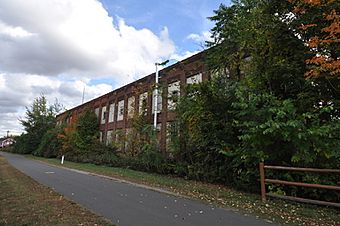Blakeslee Forging Company facts for kids
|
Blakeslee Forging Company
|
|
|
U.S. Historic district
Contributing property |
|
 |
|
| Location | 100 W. Main St., Southington, Connecticut |
|---|---|
| Area | 3.5 acres (1.4 ha) |
| Built | 1912 |
| Architectural style | Colonial Revival |
| Part of | Plantsville Historic District (ID88002673) |
| MPS | Historic Industrial Complexes of Southington TR |
| NRHP reference No. | 88002676 |
Quick facts for kids Significant dates |
|
| Added to NRHP | December 8, 1988 |
| Designated CP | December 1, 1988 |
The Blakeslee Forging Company is a cool old factory building in Plantsville, Connecticut, a part of Southington, Connecticut. It's a historic place because it shows us what factories looked like a long time ago. This company, started in 1877, was really good at something called 'drop forging.' The buildings you see today were mostly built around 1910. Because they are so well-preserved and important, these buildings were added to the National Register of Historic Places in 1988.
Contents
What is the Blakeslee Forging Company?
The Blakeslee Forging Company is a group of old factory buildings. It's located in the Plantsville area of Southington. These buildings are important because they show how factories were built in the early 1900s.
Where are the Buildings Located?
The factory buildings are a bit hidden from the main street. They are behind a parking lot and another old factory. The biggest buildings are shaped like the letter "T".
One part of the "T" is a two-story brick building. It has many windows and a classic factory look. The other part of the "T" is a longer, one-story brick building. It has a sloped roof.
There's also a smaller brick building nearby. A few even smaller buildings are tucked behind these main ones.
When Was the Company Started?
The Blakeslee Forging Company was founded in 1877. Sherman Blakeslee started it. At first, the company used older wooden buildings on this same spot.
Most of the buildings you see today were built later. They were constructed between 1912 and 1914. This was after the older wooden buildings were taken down.
What Did the Company Make?
The company made parts for carriages. Carriages were like old-fashioned cars pulled by horses. They also offered "drop-forging" services. This means they shaped metal by dropping heavy hammers onto it. It was a special way to make strong metal parts.
 | Lonnie Johnson |
 | Granville Woods |
 | Lewis Howard Latimer |
 | James West |



